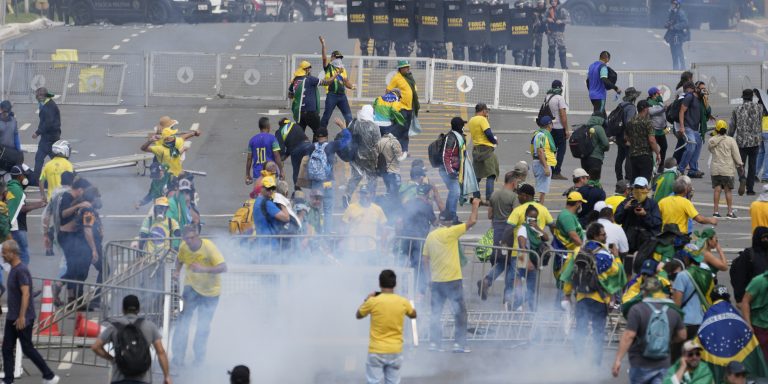INTELBRIEF
January 10, 2023
IntelBrief: Far-Right Extremists Threaten Brazil’s Democracy

Bottom Line Up Front
- Over the weekend, thousands of supporters of Brazil’s former President Jair Bolsonaro stormed government buildings and institutions in what looked eerily similar to images following the U.S. Capitol insurrection of January 6, 2021.
- In the weeks leading up to Sunday’s riots, Brazilian social media channels were inundated with violent rhetoric and calls to wreak havoc throughout the country, as far-right extremists threatened attacks against infrastructure.
- The parallels to January 6th in the United States are impossible to ignore, even down to the language used, with Bolsonaro supporters referring to each other as “patriots” in online exchanges and U.S. personalities like Steve Bannon challenging the election results.
- Washington lacks the credibility to chide its ally, considering that the United States established the blueprint for election denialism and anti-government violence with what occurred at the U.S. Capitol just over two years ago.
Over the weekend, thousands of supporters of Brazil’s former President Jair Bolsonaro stormed government buildings and institutions in what President Luiz Inácio Lula da Silva has condemned as “terrorist acts.” It looked eerily similar to images following the U.S. Capitol insurrection of January 6, 2021. In the capital city of Brasilia, far-right protestors overran Brazil’s Supreme Court, Congress, and presidential palace, fueled by disinformation and fraudulent claims of a stolen election. These were echoed by far-right personalities in the United States, like Steve Bannon, who circulated claims of a stolen election on his show and the hashtag #BrazilianSpring to encourage challenges even after Bolsonaro appeared to accept the results. Such narratives were propagated even early on, following the first round of elections, when a guest on Bannon’s show reportedly declared, “the whole thing smells.” Sunday’s demonstrations turned violent, with buildings ransacked and police officers physically attacked with clubs and other weapons. As angry mobs shouted slogans, there were calls for Brazil’s military to remove President da Silva from office. Given Brazil’s history with military dictatorship — which ruled the country for more than two decades between 1964 and 1985 — the potential for a military coup was a major concern, as well as reported incidents of law enforcement officers encouraging or facilitating the violent protesters. More than 1,200 people have been detained in connection with the incidents, as President da Silva called for a state of federal intervention, which affords authorities more leeway to enforce public security.
Reportedly in the United States on an A-1 visa reserved for heads of state, Bolsonaro condemned acts of vandalism. He has, however, not publicly conceded his election loss, instead alleging voter fraud, advancing a Brazilian version of former U.S. President Donald Trump’s ‘Big Lie.’ He also refused to dissuade his supporters from gathering in large groups outside of military bases, where they repeatedly harangued the military to launch a coup to install Bolsonaro after his election loss. On Telegram and TikTok, electoral conspiracies proliferated, with terms such as “rigged ballots” surging, according to reports from the Washington Post. Other popular hashtags included terms such as “election fraud” and “stolen election” in Portuguese, Brazil’s primary language. In the weeks leading up to Sunday’s riots, Brazilian social media channels were inundated with violent rhetoric and calls to “wreak havoc” throughout the country, as far-right extremists threatened attacks against infrastructure. Fires were set in various government buildings, and journalists attempting to cover the mayhem were beaten and intimidated.
The parallels to January 6th in the United States are impossible to ignore, even down to the language used, with Bolsonaro supporters referring to each other as “patriots” in online exchanges and narratives about stolen and rigged elections. “Give us the source code” yelled protesters, referencing the belief that voting machines were rigged in favor of da Silva. Throughout his tenure, Bolsonaro repeatedly expressed his admiration for Trump, even emulating some of his administration’s language surrounding the handling of the coronavirus, which both the United States and Brazil dealt with poorly, especially during the first several months of the outbreak. Both leaders have also consistently shown disdain for environmental regulations. And like Trump, Bolsonaro laid the groundwork leading up to the events of January 8, 2023, for months, insisting that if he was to lose the late 2022 election, it must be due to fraud. Moreover, Bolsonaro has also captured the imagination and political momentum of many Brazilian evangelicals, capitalizing on deeply contentious issues, such as abortion, and invoking religious language in his speeches. Images of protestors lifting Bibles and other religious iconography and kneeling to pray as they stormed the presidential palace during Sunday’s riots were reminiscent of images on January 6th. The parallels continue to reinforce the growing threat of Christian nationalism, a movement gaining momentum globally and increasingly violent in nature.
U.S. President Joe Biden condemned the assault on Brazil’s government institutions on Twitter, writing: “I condemn the assault on democracy and on the peaceful transfer of power in Brazil. Brazil’s democratic institutions have our full support and the will of the Brazilian people must not be undermined.” Yet, Washington lacks the credibility to chide its ally, considering that the United States established the blueprint for election denialism and anti-government violence with what occurred at the U.S. Capitol just over two years ago. Other democracies, including Canada, Germany, and France, to name just a few, have similarly struggled with a rise in anti-government sentiment. While to many, the U.S. still stands as the example of a “shining city on a hill,” to use former President Ronald Reagan’s words, others have argued that now the U.S. is more synonymous with exporting anti-democratic extremism and conspiracy theories, rather than liberty and democracy. Globally, authoritarian leaders, demagogues, and populists have taken notice, adding fodder to their arsenal as a rebuke to U.S. criticisms over human rights abuses and sham elections.